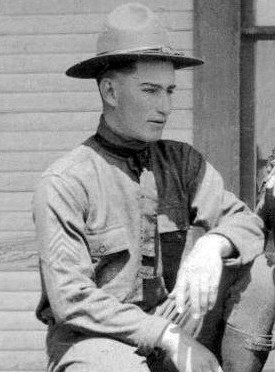Before I get into todays story, after you read this click on Outdoor Bloggers , www.heartlandoutdoorsman.com/blog/ and look at the new promotions they have on their message board.
Today is Memorial Day, that had its beginnings in 1863, as Decoration Day, when Confederated dead were remembered in the South, with red, white and blue bunting, placed upon their graves. I thought it fitting that I post this story from my family’s history. This story was first told to me by my Uncle, Roy Bryan, who was an eye witness to the events of December 7, 1941. Roy passed away several years ago and I believe that his story should be recorded and retold
LIVING HISTORY
By Jon Bryan
How could this have happened? That was the Nation’s question on the morning of December 8, 1941. Roy Bryan’s question was how did I, a civilian, end up in a shallow trench on a beach on the island of Oahu, with a 16 gauge, Winchester, sawed off shotgun, watching the sun come up over Diamond Head, waiting for the inevitable Japanese invasion?
It all started on December 6, a Saturday. Roy, 25 at the time, was a carpenter and had been doing some interior work on a Battleship for the Navy where he had become friends with some of the Sailors. There was a big party in Honolulu that night and he was going to it with his Sailor friends. He hoped it wouldn’t be an all nighter, because he had also planned to go fishing later in Aiea Bay, eat an early breakfast and sleep most of Sunday.
The Bryan family has always had an urge for new, different things and to keep moving west. Roy was my Dad’s brother, and my Uncle, and his urge caused him to leave Texas and migrate to Hawaii in 1939. By then, he was already, like his Dad, Peyton had been, a skilled carpenter and there was plenty of work available in the Islands.
The party, like all big parties, was loud and crowded, but the exceptionally pretty girls kept him there to almost midnight. His Sailor friends invited him to come back to the ship with them and spend the night there. He replied, “No thanks buddies, I’m going fishing in the bay and sleep most of tomorrow. I’ll see all you all on Monday.”
The fishing was good as usual and he had a nice “mess” for supper that night. The morning was breaking and he enjoyed the sight of Ford Island and Battleship Row across the bay from him and thought it was a good time to be rounding up his gear and heading back. From out of the north he could hear airplanes, not unusual because our Country was beefing up our Pacific defenses since our relations with Japan were worsening.
The planes kept coming, and when they cleared the hills, he could see they weren’t the big, B17s, that had been ferrying in, just single engine planes that didn’t look like the F4F’s or SBD’s that flew off of our Carriers. Strange, but as the planes came screaming in, he could clearly see the red ball on the wings and fuselages, just as the first bombs and torpedoes were released, their targets being our Battleships – Japs!
Feeling the concussions from the thunderous explosions, his first action, with his mind racing, as the Battleships were being hit, was to get behind a Coconut tree and peer around and watch the spectacle. He clearly saw the Arizona, or the ship berthed beside it, being hit and a great explosion and thought of his friends aboard who had invited him to spend the night with them. The poor guys! Then, the torpedo planes had finished their work, and along with their fighter escort, were leaving.
He moved to gather up his gear, when he heard more planes approaching from the east. More Jap planes and he snuggled down behind his tree and watched the bombers pound our Pacific Fleet. The harbor was all confusion, ships exploding and maneuvering to keep the channel clear, fires raging on the ships and on shore, sirens screaming and black smoke spiraling skyward! A scene from hell! And, even though he had watched every minute of the attack, but for fate, he could have been more in the middle of it and doomed on the U.S.S. Arizona!
The Japs flew away and Roy thought, we are at war with Japan. Finally moving off of the beach he tried to drive toward Pearl Harbor, but the roads were closed. He was stopped and told to report to “such in such place” and await orders. Martial law had been imposed and he guessed all able bodied men had been “drafted” into service.
The officials were positive the Japs would invade the Islands, Oahu especially, and, he was right, all able bodied men were guarding the beach for the next several nights. No invasion, but the World and the Hawaiian Islands, along with Roy, would forever change after that day, December 7, 1941!

